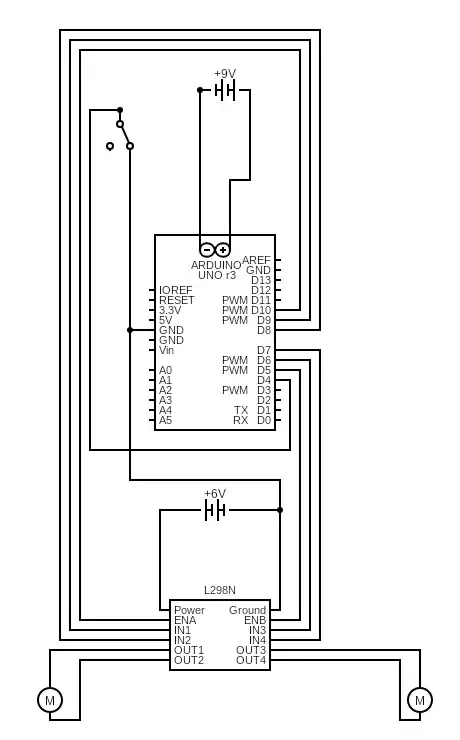I'm using an arduino connected to 2 DC motors through L298N. the arduino is powered by a 9V battery, and the L298N is powered by 4 AA batteries. there's also a switch that starts the movement.
I've added print statements to debug, one in the setup, one in the start of the loop, and two before and after running so i know when the motors start and how long they run. I also print the state of the switch. this is what i get:
1 // switch state. 1 means off.
loop // start of loop statement
1
loop
0 // switch state changed to on
0 // added another switch check after the if
Forward for: 5 seconds // motors on
setup // reset for some reason
loop // start of loop
0 // switch still on
setup // another reset
loop
0
0
Forward for: 5 seconds // motor starts again
setup // another reset
loop
0
0
Forward for: 5 seconds // stuck with the motors on, no more resets
its not always this bad, sometimes it runs once or twice correctly (for five seconds) and then off. some times it gets stuck on without reseting. also, sometimes it starts reading the switch value as 1 after a few seconds of reading the correct value, even though the switch wasen't moved. also, when I remove one of the motor batteries so they don't get power everything works great. What causes the reset and the freezing? How can I fix that?
this is my code:
#include <Arduino.h>
int RightSpeedPin = 5;
int Rdir2 = 6;
int Rdir1 = 7;
int led = 13;
int LeftSpeedPin = 10;
int Ldir2 = 8;
int Ldir1 = 9;
int SwitchPin = 4;
int ReadVal;
int baseSpeed = 230;
int Stime;
int Etime;
void go(int d) { // d = 1 will move, d = 0 will stop
analogWrite(RightSpeedPin, (d == 1 ? 230 : 0));
analogWrite(LeftSpeedPin, (d == 1 ? 255 : 0));
}
void forward(int t) {
Serial.print("Forward for: ");
Serial.print(t / 1000);
Serial.println(" seconds");
digitalWrite(Rdir1, HIGH);
digitalWrite(Ldir1, HIGH);
digitalWrite(Rdir2, LOW);
digitalWrite(Ldir2, LOW);
digitalWrite(led, HIGH);
Stime = millis();
while (millis() < Stime + t) {
go(1);
}
go(0);
Etime = millis();
Serial.print("ran for ");
Serial.println(Etime - Stime);
digitalWrite(led, LOW);
}
void spin() {
digitalWrite(Rdir1, LOW);
digitalWrite(Rdir2, HIGH);
digitalWrite(Ldir1, HIGH);
digitalWrite(Ldir2, LOW);
Stime = millis();
while (millis() < Stime + 100) {
go(1);
}
go(0);
}
void setup() {
// put your setup code here, to run once:
pinMode(Rdir1, OUTPUT);
pinMode(Rdir2, OUTPUT);
pinMode(RightSpeedPin, OUTPUT);
pinMode(LeftSpeedPin, OUTPUT);
pinMode(Ldir1, OUTPUT);
pinMode(Ldir2, OUTPUT);
pinMode(SwitchPin, INPUT_PULLUP);
pinMode(led, OUTPUT);
Serial.begin(9600);
Serial.println("setup");
}
void loop() {
Serial.println("loop");
ReadVal = digitalRead(SwitchPin);
Serial.println(ReadVal);
if (!ReadVal) {
delay(500);
Serial.println(ReadVal);
// starting situation- both motors heading forward
// running for 5 secs
forward(5000);
delay(1000);
spin();
}
}
and this is my scheme:
